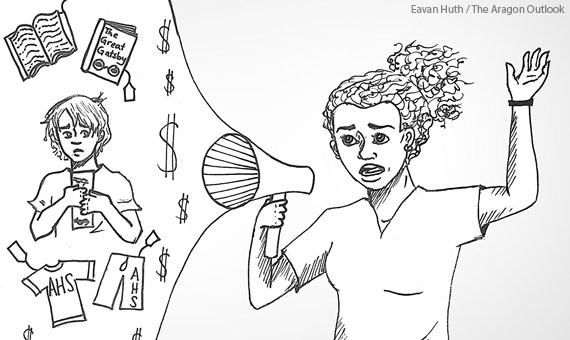
Free, public education is a cornerstone of American culture. However, the definition of “free” education is under debate as Californian education confronts a new law that declares all school fees to be illegal. Gov. Jerry Brown signed the assembly bill, AB 1575, which forbids the schools from requiring students to pay for PE uniforms, textbooks, lab fees, extracurricular activities or security deposits.
In response to this new law, history teacher William Colglazier says, “Our education still has inequality within it. [This law] is an attempt to fix it.” The new law also raises the question of what it means for education to be truly “free.”
Junior Sean Gao says, “Right now, public education is free in the sense that you don’t have to pay teachers to teach you.”
This law arose out of a lawsuit beginning on Sept. 9, 2010, when the American Civil Liberties Union (ACLU) sued the State of California, arguing public schools forcing students to pay for school supplies violated state constitution. The Los Angeles Superior Court ruled in January of this year that ensuring that schools were not collecting unconstitutional funds from their students was the State of California’s responsibility. The ACLU dropped their lawsuit in response to the recently enacted law.
In the past couple of years, Aragon has eliminated many requirements for students to purchase materials. These changes in school policy have been met with a mixture of displeasure and approval from Aragon teachers.
English teacher Victoria Daniel says, “I understand [the ACLU lawsuit’s] position. However, it puts schools in a really difficult position. The reality is we don’t have everything we need.”
To comply with the new regulations, Aragon must have copies of any books read in English classes available for students. The English department met to discuss the ruling and decided that freshmen English classes would no longer require summer reading, since it would be too difficult to provide books, a change that Daniel regrets. Daniel says, “We should have tried to make [summer reading] work. I’ve never had a kid come to me and say, ‘I didn’t do my summer reading because I couldn’t afford it.’”
On the other hand, Athletic Director Steve Sell thinks that the new policy has had a positive effect upon Aragon athletics. Sell says, “I think [the new policy is] good… I just found it absurd that we had to go to the parents to supply basic equipment like balls. Now, [P.E. students] can supply their own school-colored shirt if they want to.” In addition, science classes no longer send out lists of suggested donations, nor can music classes charge additional fees for dress clothes.
Aragon still permits some charges, such as requiring students to pay for optional music field trips and cleaning costs for performance clothes. However, with the installment of the new law, these charges could also come under contention.
Junior Melissa Ma says, “I don’t think it’s fair, especially for specific low income families who don’t have the means to buy school books.”
Teacher Jennifer Wei does not think that the ruling has had much of an impact on Aragon. Wei says, “Aragon has a tradition of students wanting to buy their novels anyway.” Although classes can no longer require students to take the $87 Advanced Placement tests, this has not been much of a problem for junior AP English. Wei says, “[I’ve] never had a student not take the AP test because of cost. The AP, for example, has fee waivers… Magically, Aragon always has enough money to cover it.”
Some of Aragon’s funds come from Aragon’s Fair Share Program, a fundraising program that helps to fund technology, library hours, and additional teachers. Since the suggested Fair Share donation of $600 is optional, it is permitted under the new laws, which allow voluntary donations. However, Fair Share does not meet all of teachers’ needs. Science teacher Kevin Doyle says, “If anybody breaks anything, [the budget] adds up pretty quickly.”
Wei says, “Ideally, [the ACLU lawsuit] makes perfect sense.” In the future, Aragon students and faculty will determine whether those ideals can meet the realities of public education at Aragon.




